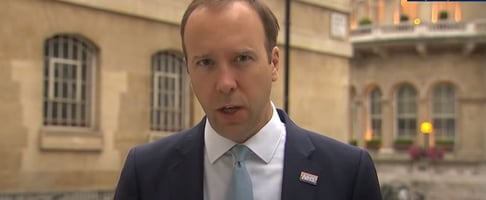Food is never far from our thoughts at Media First towers.
One of the golden rules of media training is not to show frustration at interview questions.
But that can be tough.
Interviews do not always go as planned, and spokespeople may face unexpected and uncomfortable questions.
They may face some that feel personal.
But when anger and frustration slip into interviews, they are propelled to a far wider audience – for the wrong reasons.
Tottenham Hotspur manager Ange Postecoglou provided an example of this on Sunday.
Not got time to keep reading? Listen to the blog instead
The under-fire boss was taking part in the routine post-match interviews that all managers give after his team lost to Everton.
And he was not impressed by the opening question from a BBC journalist.
Here is the exchange.
Reporter: Ange, familiar story? What are your assessments of that performance, please?
Postecoglou: Familiar story?
Reporter: Well, in terms of defeat
Postecoglou: Yea, okay. Great way to start an interview.
Footage of that clip posted by BBC Sport has had more than seven million views on X alone.
"Great way to start an interview." 😳
— BBC Sport (@BBCSport) January 19, 2025
Ange Postecoglou wasn't a fan of this question 😬 pic.twitter.com/ONlbG7Dozy
And what trends often results in mainstream media coverage.
Football is a tribal sport. Loyalty runs deep, and supporters will go out of their way to defend those associated with their club.
But even the most loyal Tottenham fans must admit this is not a clever way to begin a media interview.
The question is not even hard-hitting or hostile. ‘A familiar story’ feels like a fair summary of a team that has endured seven defeats in its past 10 league games.
The tetchy, dismissive and arrogant reaction to it shows a lack of respect for the journalist. And it feeds the narrative of a manager struggling to cope with the pressure.
We always stress during our media training courses that journalists ask the questions they believe their audience wants to be answered.
So, it is vital spokespeople don’t get rattled or show anger and frustration at the questions they are being asked, including being sarcastic.
It is crucial to remain calm and composed.
Not only does it help you avoid negative headlines and social media posts, but the audience is more likely to be sympathetic.
It is also vital to remember that once you have shown your anger or frustration, it is effectively game over. It is all people will remember.
The Tottenham manager went on to give a reasonable enough answer after voicing his displeasure at the question – albeit with almost no eye contact (another media interview own goal).
But all people will remember is that initial reaction. We all love a bit of conflict. Angry responses in media interviews make for great television and radio. They are widely shared on social media and make easy headlines. And they become the focus of the story.
So, what can you learn from this?
Composure is crucial.
Easier said than done, perhaps. But spokespeople cannot afford to take questions personally.
Don’t show your dislike of a question.
That doesn’t mean you cannot disagree with what the question suggests. For example, instead of criticising the ‘familiar story’ line of questioning, the Spurs manager could have said something like, “That’s not how I saw it. I thought that…”
Preparation and anticipating uncomfortable questions are also vital.
Consider and work through difficult questions that might come up to reduce the chance of being caught off guard during interviews. It builds the confidence to handle them during the interview.
If you’ve been caught off-guard by an unwanted question, buy some thinking time.
A brief pause or a phrase like ‘that’s a good question’ – as long as it is used sparingly and calmly – can give you a few moments to gather your thoughts and plan how you can respond professionally.
It is also critical to remember it is inevitable that tough questions will come up at some point. They are not just reserved for politicians and under-pressure football managers.
Even interviews on positive subjects can include composure-testing questions.
What about an example of someone who handles the pressure well?
It is often easier to find ‘how not to do it’ media training examples.
But a great example of how to remain composed when facing difficult questions was provided by Oxfam GB CEO Dr Dhananjayan Sriskandarajah after his charity published an inclusive language guide a couple of years ago.
The publication was met with a significant backlash, and he faced some provocative questions when he appeared on Good Morning Britain that could have produced an emotional response.
Here’s how he responded to the word ‘mother’.
“Let’s talk about the word mother,” he said.
“We’re about to celebrate Mother’s Day, and please come to one of our shops up and down the country where we will be prominently celebrating the role of motherhood in our society.
“What this guide is saying is what my kid’s school has been saying for a long time – a lot of the forms we fill in these days at school say parent or guardian. They don’t say mother or father, recognising that there are same-sex couples, there are trans and non-binary parents.
“So, we are just updating our language to catch up with most British organisations.”
The question is handled calmly. But there is more to it than that.
Firstly, there is a risk critics can present guidance like this as being created by someone out of touch with the real world.
Comparing the language suggestion to that used in a school letter – something many viewers would be able to relate to – dispels that notion and shows it has been happening for some time.
The other aspect I like is that it is a detailed answer. When questions become aggressive, spokespeople often fall back on short answers.
It would have been easy for Dr Sriskandarajah to say something like, “We’re not banning the word mother”.
But such an answer would sound defensive and surrender control of the interview.
I wonder if he fancies taking on the Tottenham job.
Media First are media and communications training specialists with nearly 40 years of experience. We have a team of trainers, each with decades of experience working as journalists, presenters, communications coaches and media trainers.
Click here to find out more about our media training.
Subscribe here to be among the first to receive our blogs.




